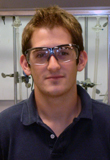What's New?
The 2007-2008 Beckman Scholars: Nick L. Simmons
| Faculty Mentor: Professor Stephen F. Martin Length of term: Summer 07, Fall 07, Spring 08, Summer 08 Honors & Awards:University Honors (Fall 06, Spring 07, Fall 08); National Merit Scholar Scholarship (2006); Robert E. Boyer Endowed Presidential Scholarship for Natural Sciences (2007); Overwatch Ward for Excelence in Chemistry Research (2008); Dorothy B. Banks Charitable Trust Scholarship (2008); The Scripps Research Institute Dean Fellowship (2009); NSF Graduate Research Fellowship (2010-2012). Publications:Nicolaou, K. C.; Simmons, N. L.; Chen, J. Tet. Lett. 2011, 52, 2041-2043. Nicolaou, K. C.; Simmons, N. L.; Ying, Y.; Heretsch, P. M.; Chen, J. J. Am. Chem. Soc. 2011, 133, 8134-8137. B. Michael O_Keefe, Nicholas Simmons, and Stephen F. Martin, Carbonylative cross-coupling of ortho-disubstituted aryl iodides. Convenient synthesis of sterically hindered ketones, Org. Lett. 2008, 10, 5301. Where is he now? Graduated with Bachelor of Science in Chemistry with Special Departmental Honors in Chemistry, May 2009. Nick is currently at graduate school at the Scripps Research Institute. How can I contact him?simmons.nick at gmail.com |
 |
Beckman research project in the Martin Group:
Download a copy of Nick's Research report, entitledCarbonylative cross-coupling of ortho, ortho-disubstituted arenes
Current efforts in synthetic organic chemistry are increasingly directed towards development of environmentally responsible reactions. Minimization of toxic byproducts and reduction of waste are concerns that all chemists must hold. Transition metal catalysis has offered an efficient means to achieve these goals.1,2 Catalytic transformations that involve transition metals offer distinct advantages to their corresponding stoichiometric transformations, in that they reduce unwanted byproducts, may be run under relatively mild conditions, and often provide superior product yields.
Although an increasing number of transition metal catalyzed reactions are reported each year, many transformations have yet to be explored, and the substrate scope of many of these reactions is limited. Among these, carbonylative cross-coupling reactions involving ortho, ortho-disubstituted arenes (1) remains a challenging area. The unsymmetrically substituted ketones (2) obtained from this reaction are valuable intermediates in the synthesis of many biologically active or structurally interesting compounds, and an efficient atom economical approach would be highly desirable.
The focus of the proposed research would be to explore and develop mild carbonylative cross-coupling conditions of ortho, ortho-disubstituted arenes. (Scheme 1) Different transition metal catalysts, ligands, and coupling partners will be explored. Once conditions are found, the substrate scope will be elaborated to a variety of useful compounds, including substrates with heteroatom substituents. Development of the proposed method would provide an efficient route to unsymmetrical ketones, as well as expand the arsenal of known transition metal catalyzed reactions.
Scheme 1
1 Trost, B. M. "Atom Economy-a Challenge for Organic Synthesis: Homogeneous Catalysis Leads the Way" Angew. Chem. Int. Ed. Engl. 1995, 34, 259.
2 Trost, B. M. "The Atom Economy-a Search for Synthetic Efficiency" Science 1991, 254, 1471.
Created and maintained by Ruth Shear. Comments to author at DrRuth@mail.utexas.edu
Created Wed Jun 6th 2007. Last modified Mon, Mar 10, 2014.